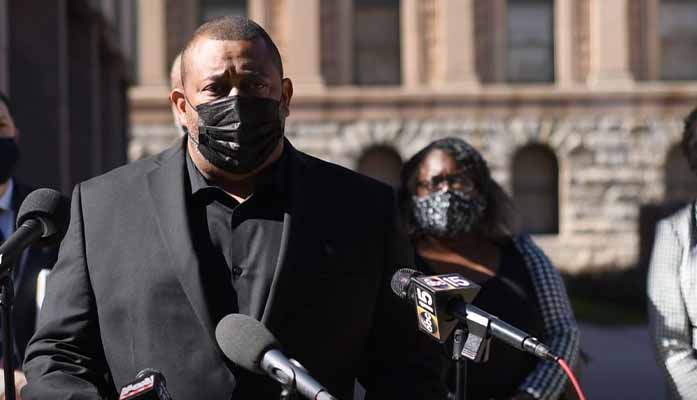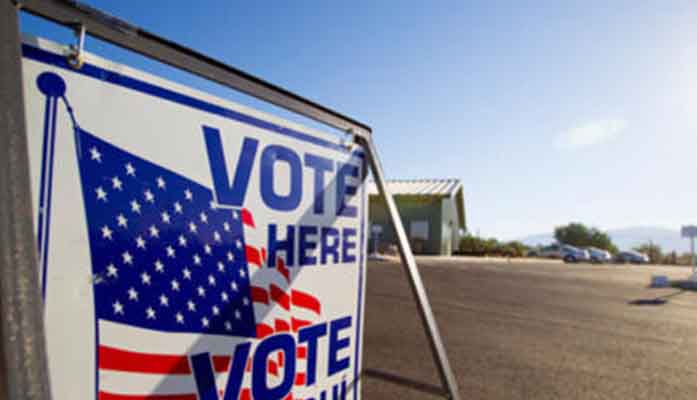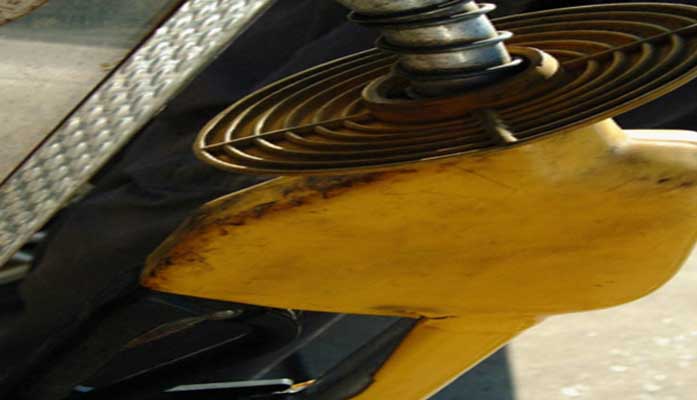
by AZ Free News | Feb 3, 2021 | News
UPDATE: Senate Bill 1452 passed out of the Senate Education Committee along party lines on a 5-3 vote on Tuesday.
PHOENIX – Prominent leaders from the valley’s Black Community gathered at the state capitol today in a call-for-action to support minority children when it comes to education in the wake of the pandemic.
They’re supporting Senate Bill 1452, introduced by Senator Paul Boyer, which would expand the state’s Empowerment Scholarship Account program to include low-income students.
“The time for equal opportunity in education is now,” Boyer said before today’s committee hearing on the issue.
A recent study shows that low-income and minority students nationwide are up to 5 months behind their peers and could be as far as 16 months behind academically by the end of the school year.
Pastor Drew Anderson, from the Legacy Christian Center in South Phoenix, led today’s group of SB 1452 supporters. Anderson, a former NFL player, says his success in life would never have come about had it not been for the educational opportunities he was given growing up in Chicago.
Anderson is attempting to unite party lines, saying, “We are in a battle not of Republicans, not of Democrats, but we are in a battle for young souls. As a registered democrat I support this bill, as a registered democrat I support anybody who supports making sure all minority children are given an opportunity to be properly educated.”
Since the pandemic began and schools across America were closed, one report puts the number of missing children, students who have not been getting any type of schooling, mostly from low-income families, at three million children. The challenges to low income families are many including poor to no internet access for virtual learning. Anderson tells of seeing families in McDonalds restaurants so their children could have access to their school work.
In addition, a survey from the Urban Institute found that 75 percent of low-income parents were unable to work from home. Which in many families means no one is available to help these students with distance-learning. Aggravating that statistic is Arizona’s ranking of 14th in the nation for single parent households.
In an effort off-set these disadvantages, Black Leaders believe lawmakers need to take action through the expansion of the existing ESA program. The proposal introduced today would help low income parents overcome disadvantages from the digital divide to unsupervised distance learning.
The measure under consideration would make funding available for a parent to pay for tutoring, educational materials, homeschool and micro-schools or money for private schools.
Janelle Wood, with the Black Mothers Forums in Arizona says she’s fought the battle for supportive and safe learning environments for “our sons and daughters”. Speaking out today, she said, “Our children deserve and opportunity, their parents, their mothers, deserve an opportunity to find a place where those children are safe and supported.”
The group contends letting minority students fall behind will create issues for the state for years to come. Right now, by expanding the established ESA program, the state’s Black Leaders say Arizona’s legislature has the option to change the course of what could be an educational disaster. Hoping to offset what is known as the prison pipeline because of a lack of education, Reginald Steele, a Pastor from Kingdom in the Valley said a better use of our monies would be investing in education, especially the school choice option.
“I would rather see us building more Penn States then Penitentiaries,” Steele said.
Senate Bill 1452 would give parents up to $7000 in ESA funds to spend on their children’s education, and cut the approval and waiting time for parents to 30 days instead of 100.
“School Choice is no longer something that can be on the back-burner,” Drew says, “but it’s actually the Civil Rights Movement of this era.”

by AZ Free News | Feb 1, 2021 | News
The Arizona Legislature may currently enact the laws which serve as the framework for elections in the state, but the nitty gritty details of how those laws are carried out is spelled out in the Arizona Election Procedure Manual (EPM), a 544-page set of rules and instructions all 15 counties must follow.
Changes to the EPM are usually recommended by those who do the majority of the work in an election – county recorders and their election department counterparts. The changes themselves, however, have to be implemented by the Arizona Secretary of State (SOS) with the approval of the Arizona Attorney General and governor.
On Feb. 1, the Senate Committee on Government is slated to take up SB1068 introduced by Sen. Michelle Ugenti-Rita (R-LD12). The bill would amend three election-related statutes dealing with the EPM, and if passed, the legislature will have a much bigger say in how their laws are put into effect courtesy of the Legislative Council.
The Legislative Council, comprised of the President of the Senate, the Speaker of the House of Representatives, and six members from each legislative chamber, would have a seat at the review and approval table, as would the Governor’s six-member Regulatory Review Council (GRRC).
The governor and attorney general would be removed from the approval process if the bill passes.
According to the Senate Research Department, there is no anticipated fiscal impact to the state General Fund associated with SB1068. The main concern expressed by the Arizona Association of Counties has been the timeline for getting review and approval passed through two councils.
The American Civil Liberties Union of Arizona and the Leadership Conference for Civil and Human Rights have come out in opposition of the bill.

by AZ Free News | Jan 29, 2021 | News
A Tucson legislator wants to outlaw hydraulic fracturing in Arizona, despite long-standing efforts by the Arizona Department of Environmental Quality (ADEQ) and the Bureau of Land Management (BLM) to facilitate energy projects in the state that utilize the practice.
Hydraulic fracturing, commonly known as fracking, is a method of extracting oil, natural gas, CO2, and helium by injecting fluid into subterranean rock formations at high pressure. The pressure dissolve dense underground rocks, creating “fractures” from which the valuable gas can be extracted.
Arizona has about 30 active oil and natural gas wells, nearly all in Apache County in the northeastern part of the state where test-fracking operations have primarily focused on extracting CO2 and helium. Fracking is already governed by a number of federal laws and regulations, including the Clean Air Act and the Clean Water Act, while state regulations are supervised by ADEQ.
And according to the Arizona Geological Survey, part of the 90-million-year-old Mancos Shale lies under northeastern Arizona, making its 60-billion-barrel formation a valuable future domestic energy source which may be best accessed by fracking methods. But HB2199 as introduced by Rep. Andres Cano (D-LD3) would add a statute outright banning hydraulic fracturing anywhere in the state.
Cano is a member of the House Committee on Natural Resources, Energy & Water (NREW) to which the bill is currently assigned although it has yet to appear on a committee agenda for further discussion.
Fracking has come under fire in some states over concerns of groundwater contamination and air pollution. However, supporters of the method in Arizona point to the fact Apache County covers more than 11,000 square miles with less than 72,000 residents, making it possible to address environmental and public health concerns through ever improving technologies while creating much needed jobs.
Cano’s bill makes no provision for any test fracking operations in place or for projects in the permitting stage. It would also make it unlawful for a person to collect, store, or treat water that has been used in or is a by-product of fracking. The bill includes no exception in the legislation for storage of residual fracking water for scientific studies or even for collecting the water for transportation.

by AZ Free News | Jan 27, 2021 | News
The House Committee on Government & Elections will consider a number of bills Wednesday morning aimed at improving election integrity and voter confidence.
On the agenda are several bills introduced by Rep. John Kavanagh, the committee chairman. One is HB2361 which would allow the tallying of early ballots as soon as the ballot envelope and affidavit is processed.
Currently county election officials cannot start to tally early ballots until 14 days before election day. This posed several challenges during the 2020 General Election due to the vast majority of voters who utilized early ballots in place of in-person voting.
Another bill, HB2181, increases the time period that a write-in candidate must file nomination papers from 40 days before an election to 76 days before, bringing it in line with other write-in related deadlines. And the bill would require a write-in candidate to be a qualified elector as well as a resident of the city, county, district, or town they want to represent for 120 days before the election.
The house committee will also consider HB2363, which would allow cities and towns to train employees to work on elections with the approval of the Arizona Secretary of State (SOS). Currently such training and certification of election officers must be conducted by the SOS, which must be reimbursed by the municipality for the cost of the training.
HB2307 would require an election official to provide an explanation to any in-person voter whose ballot triggers an overvote warning when inserted into an electronic ballot box. Similar to SB1025 introduced by Sen. Kelly Townsend, it would ensure voters understand that overriding the warning means none of the votes cast in an overvoted section of the ballot will be counted.
The committee is also expected to consider whether to replace Rep. Gail Griffin’s hand count bill HB2039 with the language of Sen. J.D. Mesnard’s SB1010. Mesnard’s bill would require counties to conduct hand counts based on precincts, even if a voting center system is in place.
SB1010 also increases the number of post-election hand counts a county must conduct of in-person ballots from two percent of all precincts to five percent or the number of precincts required to achieve a statistical significance consisting of a 99 percent confidence level with a margin of error of 1 percent, whichever is greater.
The bill also addresses who can request a hand recount in a contest that is not subject to an automatic recount.

by AZ Free News | Jan 26, 2021 | News
Six Arizona Democrats have introduced a bill that would amend the state’s criminal statutes by imposing a minimum $1,000 civil penalty on lawful gunowners who do not lock up their gun, carry the firearm on their body, or have it within “such close proximity” that it can be readily retrieved as if on one’s person while inside their home.
HB2582 would create Arizona Revised Statute 13-3123, entitled Misconduct Involving Storage of Firearms or Ammunition. It calls for a civil fine of at least $1,000 for each violation by a person in a residence they control for not having a firearm “in a securely locked box” or equipped with “a device that renders the firearm inoperable without a key or combination.”
The only exception would be if the person carries the firearm on his or her person inside the residence or has the gun “within such close proximity to his person that the person can readily retrieve and use the firearm as if it was carried on his person.”
The same lock it up, disable it, carry it, or have it readily retrievable mandate would apply to all sizes of firearms, including hunting rifles. It also applies to all ammunition, according to the bill sponsored by House Assistant Minority Leader Jennifer Longdon, along with Reps. Randall Friese, Daniel Hernandez Jr., Diego Rodriguez, Athena Salman, and Lorenzo Sierra.
There is no exemption in HB2582 for homes without children, for home-based businesses, or other situations where there would be no undue risk to others from placing one’s loaded but unlocked firearm in one room of a residence while the person is in another room.
The sponsors apparently do not consider it misconduct under their bill to have one’s gun unlocked in a garage or on a deck. The bill also does not address guests who bring an unlocked firearm or ammunition into someone else’s residence.
In 2016, it was estimated that Arizonans own nearly 6.9 million guns. That estimate is believed to have hit 7 million in 2020 based on gun industry sale reports.




